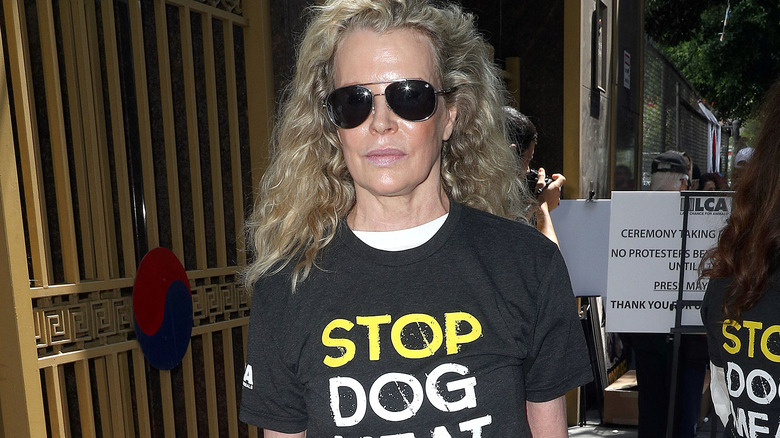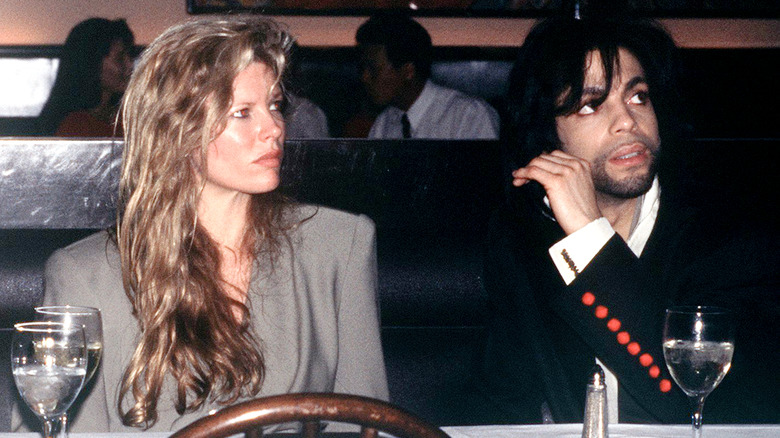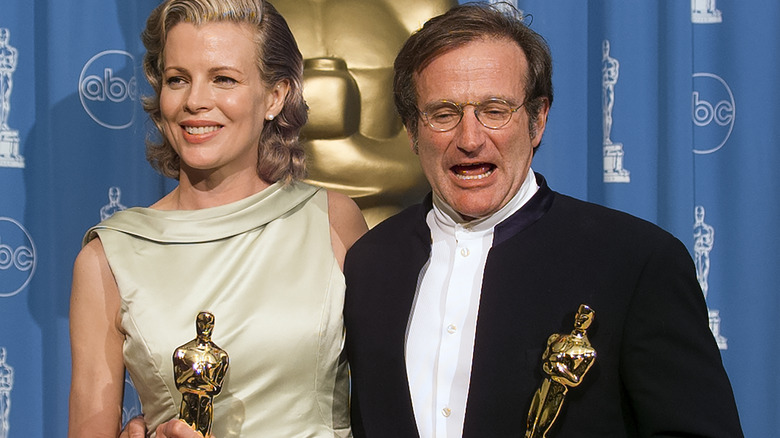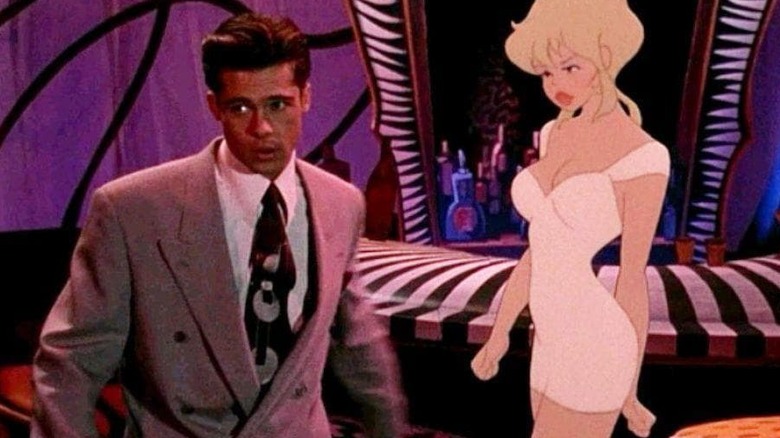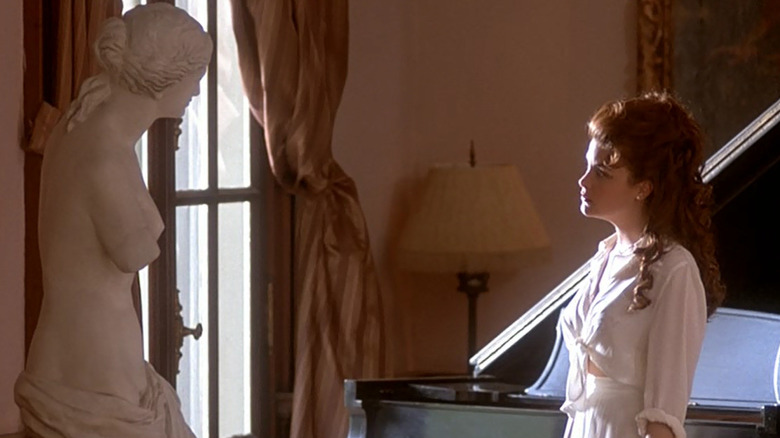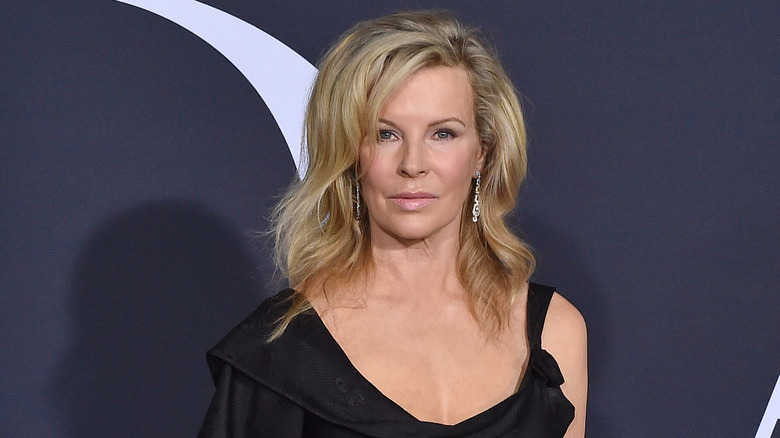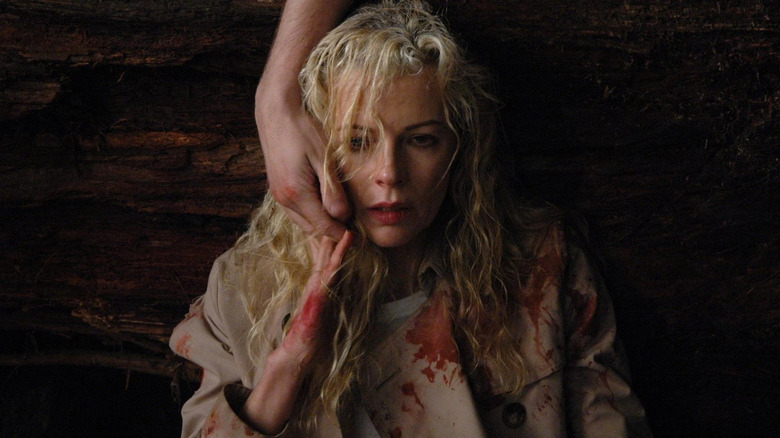Whatever Happened To Kim Basinger?
For a time, Kim Basinger was one of the biggest stars in Hollywood. She won an Oscar, starred as one of the "James Bond" franchise's iconic Bond girls, and was one of the most in-demand actors in the industry. Like many other stars, Basinger eventually faded away from the spotlight. In recent years, it has become rare to hear from her at all, let alone to see her up on the big screen.
So, what happened to Kim Basinger? Let's take a look back at the trajectory of her career, analyze the ups and downs, and break down the most pivotal moments that shaped her current place in Hollywood. From box-office flops to failed side projects and behind-the-scenes scuffles to personal scandals, these are the elements that molded her career over the years into what it is today. Since Kim is a surprisingly controversial figure, there is plenty of sensationalized messiness to sift through, so let's dig into the details.
She aged out of her typecasting
Kim Basinger got her start as a model back in the 1970s. As a teen and later adult fashion model, Basinger found great success. She continued modeling as her acting career took off and even posed for a famous Playboy photoshoot that was released at the same time as her Bond girl role in 1983's "Never Say Never Again."
In Hollywood, Basinger was frequently cast in movies based on her looks first and foremost ahead of her acting abilities. With many of her roles being femme fatales, love interests, and erotic thriller characters, Basinger's physical appearance was key to her success in the industry. The sad reality of Hollywood is that aging often unfairly hurts the careers of women far more than men when it comes to acting. Over the years, Basinger simply aged out of the type of role that she was best known for and was largely typecast in.
As her bread-and-butter roles stopped being an option for her, Basinger began taking on different sorts of characters, but didn't find much success. Many in Hollywood considered her to lack the dramatic acting chops necessary to handle other types of roles, and her big parts became fewer and farther between until they eventually stopped heading her way entirely, leading to a period of low-budget and straight-to-video movies for Basinger.
She has made more than four times as many bad movies as good
Kim Basinger is best known for a handful of hit movies like "L.A. Confidential" and "Batman" that performed extremely well at the box office and were both commercial and critical successes. The trouble was, outside this smattering of beloved movies, Basinger's hit rate was extremely low.
According to Rotten Tomatoes aggregations, Basinger's overall filmography is packed with more than quadruple as many duds as winners. In total, she has just six movies that earned positive scores from both critics and general audiences, one of which was her small supporting role in 2016's "The Nice Guys," which sits as one of her last live-action roles to date. On the other hand, Basinger has had 26 movies that were slapped with rotten scores by critics and audiences alike. These include three movies with single-digit percentage scores from critics. The lowest of all is her 2000 thriller dud "Bless This Child," which just barely avoided a straight-up 0% score.
With so many of her movies being disliked across the board, it is no surprise that Basinger's star power began to wane over time. A film career can only sustain so many bombs before the studios stop handing out extra chances, and Basinger arguably got more chances than most.
Her music career never took off
Alongside acting and modeling, Kim Basinger also had an interest in music, with a particular passion for singing. While her film career was in full swing, Basinger attempted to diversify with music as well. Around the early '90s, she released a handful of singles, which were mostly covers or collaborations with other, more established artists like Ozzy Osbourne and Prince, the latter of whom she was in a highly publicized romantic relationship.
Basinger's love and work relationship with Prince was the most central dynamic at the heart of her foray into music. Together, the two recorded an entire album titled "Hollywood Affair." The album was recorded in 1989, but was never released in any official capacity. The Prince/Basinger relationship supposedly culminated in Basinger leaving Hollywood to be with the musician in Minneapolis, only for her family to show up and forcibly split the couple up.
Though it was never officially released, the "Hollywood Affair" album eventually wound up receiving an underground release in 1997 in Germany, of all places. The album subsequently made its way onto the internet, where it can still be found today, but this all happened long after Basinger left music behind. When she was motivated in attempting to carve out a career for herself as a singer, she didn't make much progress, and she stopped actively pursuing that dream pretty quickly.
She got an Oscar but also nine Razzies
Kim Basinger's single most acclaimed performance can be found in 1997's "L.A. Confidential." She plays an archetypal femme fatale of the film noir genre as Lynn Bracken, a Hollywood prostitute who looks suspiciously like real-life noir movie star Veronica Lake. The role earned Basinger a BAFTA nomination, plus a Golden Globe and Oscar win. The role also proved to anyone who doubted her talents that Basinger was capable of delivering an excellent performance when given the right script.
Unfortunately, Basinger had plenty of roles both before and after her Oscar win that called her acting talents into question. Throughout her entire career, she has repeatedly been a guest of dishonor at the Razzies, the cynical inverted version of the Oscars highlighting the worst of cinema each year. Countering her single Oscar nomination and win are her nine Razzie nominations and one win. Prior to her Oscar, she was Razzie nominated for "9 ½ Weeks," "The Marrying Man," "The Getaway," and a double nomination in 1993 for both "Cool World" and "Final Analysis." Just a couple of years after winning her Oscar, she was again double-nominated for Worst Actress at the 2001 Razzies for the dud combo of "Bless This Child" and "I Dreamed of Africa."
For her numerous Razzie nominations, Basinger was also given a special nomination for the worst actress in the history of the Razzies when looking at her entire filmography. Finally, in 2018, Basinger was awarded the Worst Supporting Actress Razzie for her performance in "Fifty Shades Darker," which is currently her final credited live-action performance, though she did reprise her role for a brief uncredited appearance in "Fifty Shades Freed."
The Cool World controversy
The title "Cool World" might not ring many bells today, but this largely forgotten movie caused a major controversy when it was released in 1992. In an effort to be the next "Who Framed Roger Rabbit," "Cool World" is a hybrid between live-action and animation that presents another film noir storyline at the intersection between humans and cartoons. Unlike "Who Framed Roger Rabbit," "Cool World" was a total failure, and many of the film's shortcomings can be directly attributed to Kim Basinger's actions behind the scenes.
Basinger appears in both animated and live-action form as the character Holli Would, a femme fatale archetype who attempts to break out of her cartoon world by seducing the human cartoonist who drew her and the titular "Cool World." The film was made by Ralph Bakshi, who was known for making adult animated films that frequently landed hard-R and X ratings. "Cool World" was meant as another gritty, violent, and sexually charged film aimed at adults. The only problem was that Kim Basinger changed her mind about the film's tone and content after the project was well underway. Basinger wished to be able to show the film to children in hospitals specifically, which was completely at odds with the established plans for the film. This led to extreme infighting behind the scenes that reached such a boiling point that a fistfight broke out between Bakshi and one of the producers.
The script was re-written behind Bakshi's back, and the production was a notorious disaster, resulting in a terrible film that bombed at the box office. The financial loss was exacerbated by the huge advertising push the film had, which even included Paramount's pricey marketing move of attaching Basinger's character to the Hollywood sign.
The Boxing Helena controversy
For as much of a mess as it was, "Cool World" wasn't Kim Basinger's biggest film controversy, nor was it even her most controversial film of the early '90s. Basinger's biggest scandal was actually for a film that she wasn't in. "Boxing Helena" is a 1993 erotic thriller and was the debut film from Jennifer Lynch, daughter of filmmaker David Lynch. Trashed by critics, "Boxing Helena" is considered by most to be a total failure, but it's possible that things may have turned out differently had Basinger not thrown a major wrench into the production.
"Boxing Helena" was a notorious disaster and was mired in controversy before it was even released as the subject of multiple protests against its taboo subject matter of a surgeon removing a woman's limbs. One of the people who was vocally against the content of the film was Kim Basinger. On its own, this would have been fine, except Basinger had previously agreed to star in the film, only to later change her mind, drop out of the project without warning, and even bad-mouth the script publicly. This abrupt change of face led to a high-profile court case in which the studio, Main Line Films, sued Basinger for breaching her agreement to star in the film to the tune of around $8.1 million. After dealing with serious financial troubles, Basinger eventually settled with the studio and paid the lower sum of $3.8 million. The role Basinger refused was also turned down by Madonna before going to star Sherilyn Fenn.
A messy divorce caused career troubles
Kim Basinger married fellow actor Alec Baldwin in 1993 after first becoming acquainted while making the 1991 music-centered rom-com "The Marrying Man." The couple had a daughter together, but ended up divorcing nine years later. With a child in the mix, an amicable divorce proved impossible, and the two battled it out over custody in the courts in a case that practically became a media circus for frenzied paparazzi. The experience was tough on Basinger, whose public reputation was damaged as a result of the case. Although Baldwin's career seemed relatively unscathed by the ordeal, Basinger's career began its downward trajectory in the immediate aftermath of their 2002 divorce.
Cut to a few years later, and the fallout from this messy divorce was still affecting Basinger. In 2006, Baldwin took Basinger back to court for allegedly violating their child-custody terms, as reported in People Magazine. Basinger pled not guilty while facing a fine of up to $12,000 and other legal ramifications.
With a second marriage that ended in divorce already behind her, a salacious romance with the musician Prince, and a string of other short-lived, highly publicized romances, Basinger looked to Hollywood like a messy public figure not worth the headache that would follow when casting her in a film. Basinger is a prime example of the unfair double standard that plagues women in Hollywood, while a male actor with a similar dating history would almost certainly find their career unaffected by the drama.
She bought an entire town
One of the most bizarre nuggets from Kim Basinger's past is the time she decided to buy an entire town. The town in question was Braselton, Georgia, a rural town with a population of just 500 residents and a total size of around 1,800 acres, which is less than three square miles. Basinger wasn't born in Braselton, but she was born in the nearby city of Athens, Georgia, which is more than 250 times larger by population and was not on the market when Basinger decided she wanted to own a piece of her home state.
After spending a year and a half negotiating the terms of the sale with the town's board of directors, Basinger purchased Braselton for the whopping sum of $20 million. For the price, Basinger bought not only all of the land in the town, but also all of the real estate and businesses included within it. At first, Basinger planned to put Braselton on the map by turning it into a tourist destination, complete with a theme park and a full remodel of the town's buildings. There was even talk of forming a movie studio and establishing a film festival in the town. Despite all of the pie-in-the-sky ambitions, none of her plans ever came to be. Braselton remained much the same as it was when she purchased it for a few years until Basinger wanted out of the arrangement altogether and sought another buyer for the town. After paying $20 million for Braselton, Basinger ended up selling the town for just $1 million, losing the vast majority of her investment.
She declared bankruptcy
Kim Basinger might have realized too late that she bit off more than she could chew when she decided to purchase an entire town for $20 million. While this massive money pit was undoubtedly the start of her monetary downfall, the straw that broke the camel's back was actually tied to her "Boxing Helena" scandal.
When Main Line Films sued Basinger for breaching her agreement to star in "Boxing Helena," a jury ordered her to pay the studio several million dollars. Unable to pay, Basinger instead filed for Chapter 11 bankruptcy. After the amount had already been reduced, Basinger was still required to pay $7.4 million, plus another three-quarters of a million dollars in attorneys' fees. Meanwhile, her attorneys estimated her net worth to only be a little over $5 million in total. It is worth noting that this was all happening while Basinger still owned the town of Braselton, Georgia, which she ended up selling that same year at a 95% loss. It is also worth noting that this bankruptcy filing did not mark the end of Basinger's movie star career, as she went on to headline many large films over the next several years, including her Oscar-winning turn in "L.A. Confidential" four years later.
Her mental health struggles
Kim Basinger has always described herself as shy, even shy to a fault for someone leading a career in the spotlight. Beyond a general sense of shyness, Basinger has always dealt with mental health struggles that could be fully debilitating at times. Her troubles with anxiety began when she was just a child, which she considers the result of having a deeply troubled mother about whom she was constantly worried. She was anxious on a regular basis and would make up excuses to stay home from school so she could be around her mother.
This intense desire to stay at home followed Basinger into adulthood and gradually blossomed into a case of full-blown agoraphobia, which made her work in the film industry extremely difficult. She described being shaky and exhausted at all times, struggling to complete everyday tasks as simple as driving a car or even opening a sliding glass door, and developing an eating disorder as an extension of the anxiety. Though this has been a struggle of Basinger's for most of her life, her divorce from Alec Baldwin has been pinpointed as the period in her life that severely exacerbated her mental health struggles and led to an extreme downward spiral.
Her one attempt at producing was a massive failure
After her roles had been shrinking for a while since her heyday, Kim Basinger made an attempt to broaden her horizons in the film industry in 2008. For the first and last time in her career, Basinger served as an executive producer. The film in question was "While She Was Out," a low-budget thriller from filmmaker Susan Montford, who never wrote or directed another movie. Basinger also starred in the film as a woman out shopping on Christmas Eve who leaves a note on a car windshield admonishing the drivers for taking up two parking spots. The owners of the car, a group of young thugs, then inexplicably spend the rest of the movie trying to murder her over the minuscule offense. With a nonsensical premise and low production values, "While She Was Out" ends up feeling like a failed vanity project designed to turn Basinger into an aged action hero, similar to how "Taken" turned Liam Neeson into an aged action star earlier that same year.
Not only did Basinger fail to impress with her over-the-top performance or action chops but the film was also a colossal financial failure. With a budget of around $6 million, "While She Was Out" brought in a shameful return of just $29k and was pulled from theaters after just a brief run before hitting DVD a few months later. Basinger continued acting on a less consistent basis moving forward, but never tried her hand at producing again.
These days, she only gives vocal performances
At 69 years old, Basinger still acts every now and then, but it has likely been quite a while since you saw her in anything. She hasn't appeared on screen directly since her brief uncredited role in 2018's "Fifty Shades Freed," with her last credited live-action appearance coming in the preceding year's "Fifty Shades Darker." Her last couple of roles have all been vocal performances, and it is looking like she may stick to voice acting only for the foreseeable future with no announced projects on the horizon.
The first of her recent forays into voice-over work arrived in one episode of the Amazon Prime series "Comrade Detective," which is a live-action series that uses American stars to dub over its Romanian characters in English. Basinger also lent her voice to "Back Home Again," which is an animated short film that toured the film festival circuit but didn't receive much in terms of a mainstream release. Basinger can be heard as Mother Bear alongside other recognizable voices like those of Norm MacDonald, Bill Burr, Martin Short, Michael J. Fox, Howie Mandel, and Jeremy Renner. Basinger's latest acting gig to date was as the voice and likeness of a character in the video game "Crime Boss: Rockay City" releasing in 2023. She appears in the game alongside the voices and likenesses of other waning celebrities like Vanilla Ice and Chuck Norris.

